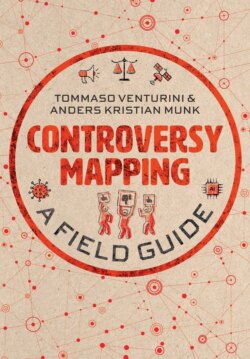Читать книгу Controversy Mapping - Tommaso Venturini - Страница 32
Commonplace and specialized controversies
ОглавлениеWhile one might be tempted to pick issues that are trending over the media and on everybody’s lips, it is important not to mistake the liveliness of a controversy with its popularity. The mere number of people interested in a debate is not necessarily an indicator of its quality as a mapping subject. In fact, it is often better to stay clear of debates that are too commonplace and instead seek out more specialized discussions, in particular those with an expert component.
This penchant for scientific quarrels is not only a legacy of the STS origins of controversy mapping. Controversies are easier to follow in scholarly disputes than in other arenas. The quarrel about gravitational waves (Collins, 1975) lends itself more easily to the prying eyes of a controversy mapper than, for instance, the quarrel about the complicity of paparazzi and the sensationalist press in the death of Princess Diana (Bishop, 1999). True, one must pay the price of learning the specialized jargon of theoretical physics, but the very specificity of this jargon and the strict definitions of what counts as a valid argument can facilitate the analysis. This does not necessarily mean that scientific discussions are more rational or coherent, but it does mean they tend to abide by more formalized and disciplined rules of argumentation.
“Scientific” should here be understood in the widest possible sense and certainly not restricted to the natural sciences. Disciplines such as ecclesiology, art history, and pedagogy offer great and feasible topics for controversy analysis (see, respectively, Flesseman-van Leer, 1962 on the dispute between Thomas More and William Tyndale; Senie & Webster, 1992 for a whole anthology of controversies surrounding public art; Dworkin & Block, 1976 on the longstanding debate about IQ measures) because they mobilize specialized knowledge, a well-defined research community, and a specific set of actions and arguments. Furthermore, scientific controversies do not necessarily happen within the walls of a laboratory and are not limited to “white coats” (see Lorenzet, 2013, pp. 47–51).
The advice to privilege controversies with an expert component, therefore, is less strict than it sounds. In fact, it is difficult to find a debate that does not concern, at least in part, some field of expertise. We mentioned the coverage of Princess Diana’s death as a “commonplace controversy,” but also provided a reference – Bishop (1999) – proving that even popular debate is indeed studied (and thereby made more legible) by an academic discipline (in this case, Bishop analyzed the debate from the viewpoint of journalism studies, to show how the discussion became the occasion for mainstream journalists to distance themselves from the tabloid press).
